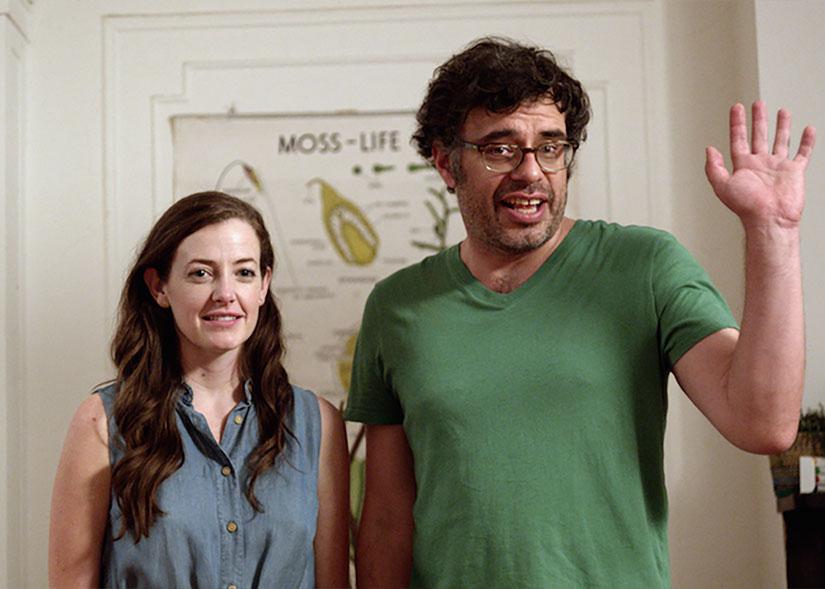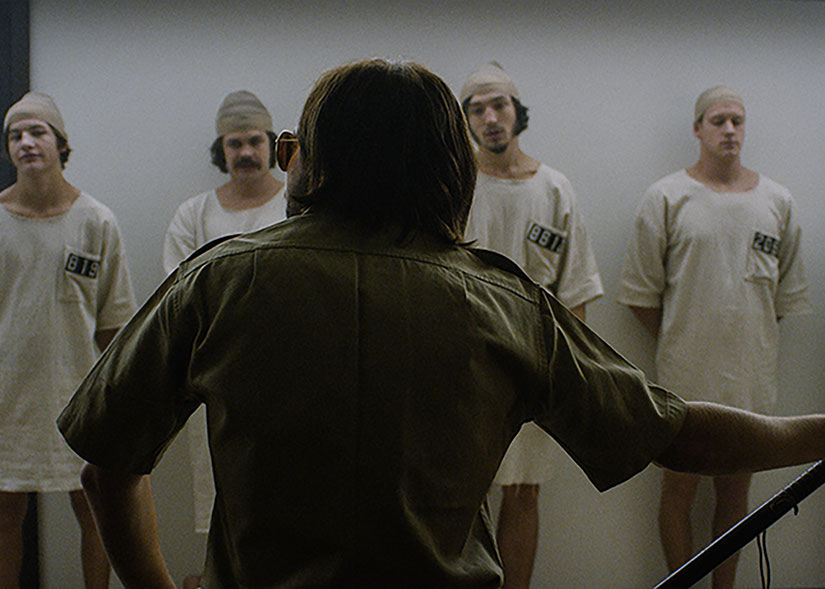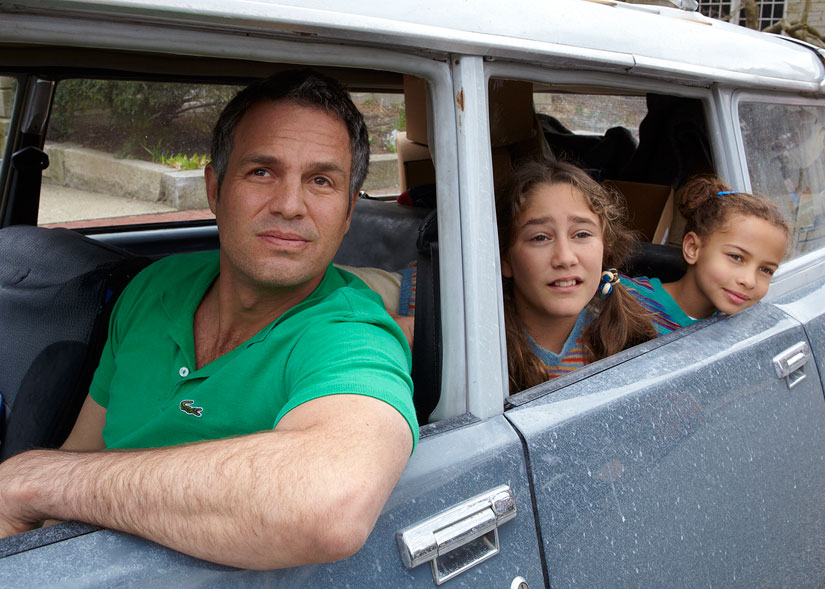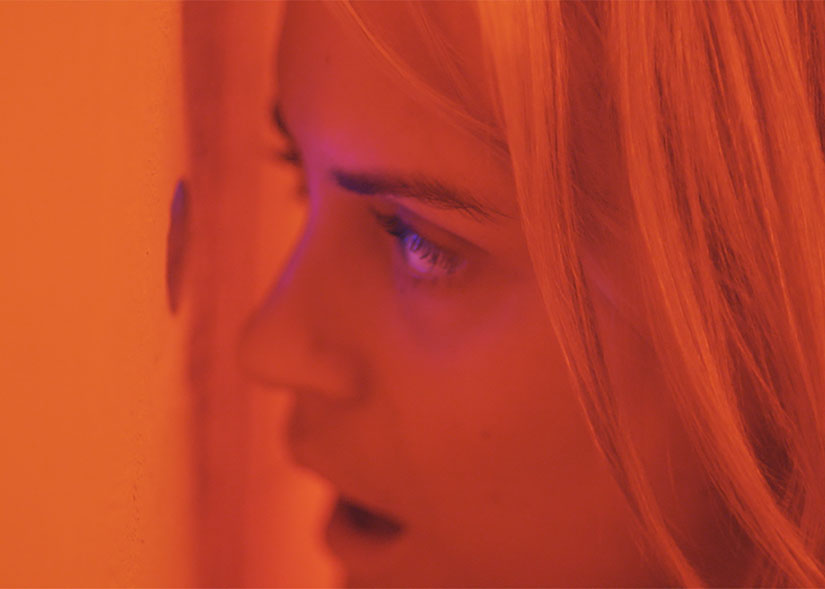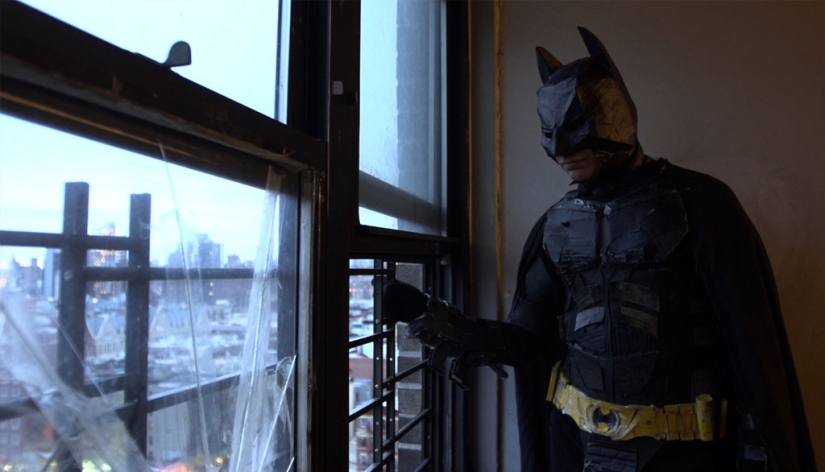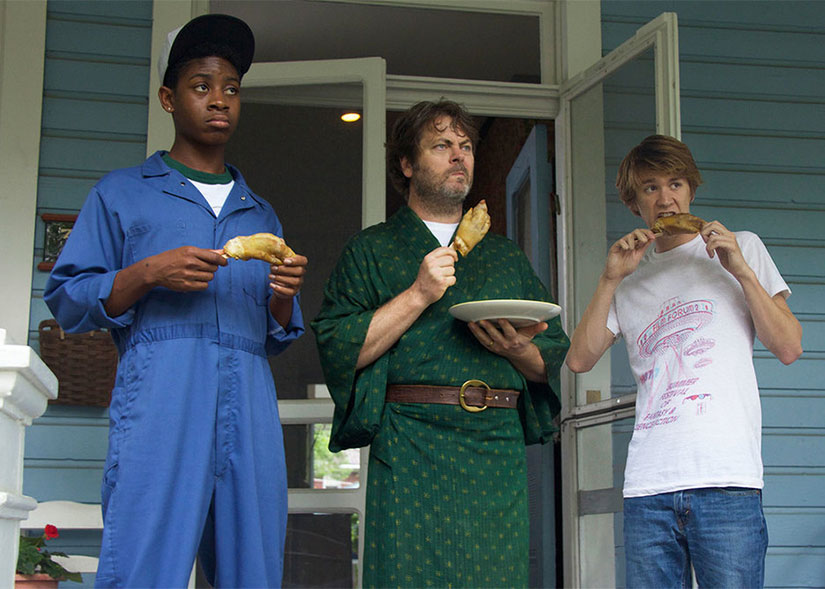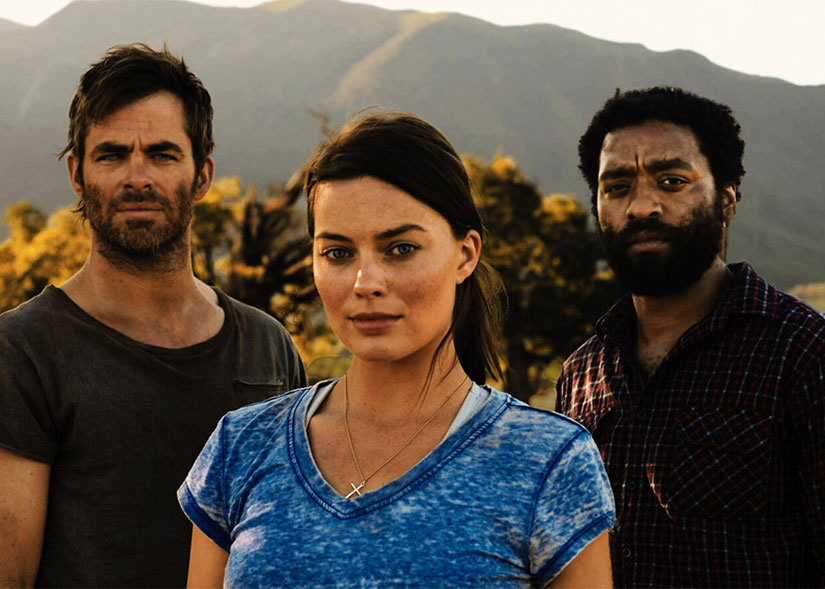[Review] People, Places, Things
This review is being re-posted to coincide with the film's VOD and theatrical release.
In most comedies involving a break-up between parents, the plot tends to naturally vilify the parent opposite of the lead, portraying them as some type of evil entity whom the lead must conquer and triumph over to win. However, this isn't often the case in real life situations, and People, Places, Things does a great job of being an inherently funny film without having to trap its characters in outlandish situations to garner laughs from its audience. However, will that be enough to hold over those who have come to expect such cartoon-like comedies?
People, Places, Things
Director: Jim Strouse
Rating: N/A
Release Date: January 26, 2015 (Sundance), August 14, 2015 (VOD, theaters)
On his twin daughters' birthday, graphic novelist Will Henry (Jemaine Clement) walks in on his wife, Charlie (Stephanie Allynne), cheating on him with another man, Gary (Michael Chernus). A year later, Will is a divorcee living in a small studio apartment in Queens with weekend visitation rights. His depression, while never taking over or defining his character, begins to show through his art and teaching during his classes at the School of Visual Arts. After discovering Charlie is pregnant and intends to marry Gary, Will requests more time with the girls, and is shortly given such time when Charlie drops them off one night. Struggling to juggle his job and responsibilities with the girls, he requests help from his student, Cat (Jessica Williams) and her mother, Diane (Regina Hall). Before long, Cat and Will hit it off, but the allure of reuniting with Charlie and completing their old family dynamic threatens to derail anything new in Will's life.
Like I mentioned earlier, most comedies of this ilk like to pit ex-lovers against one another in some type of competition, but People, Places, Things doesn't go that route. In fact, despite a few disagreements, both Will and Charlie genuinely like each other. Rather than creating a conflict that's person vs. person, People, Places, Things falls more in line with person vs. self conflict, and it could be argued that the film is just as much a coming-of-age film as it is a dramedy. Writer/director Jim Strouse wrote the script with some of his personal anecdotes in mind, which help explain why the script feels so grounded in reality. Despite a solid script with well-crafted jokes, the film wouldn't have worked as well had Clement not been cast in the role of Will.
In a way, People, Places, Things is a bit of a vehicle for Clement as he's able to show off his quick-witted timing and his ability to balance that with drama. Fans of Flight of the Conchords will feel familiar with Clement's witticisms and side jokes, but can also appreciate Will's longing to be a good father.
People, Places, Things is a solid dramedy that serves as a highlight role for Clement. Anybody interested in a realistic comedy that doesn't create villainous caricatures of its characters will be drawn to the film, as well. However, audiences that have grown too familiar with Judd Apatow, Will Ferrell, or Paul Feig films may find People, Places, Things a bit too pedestrian for their tastes.
[Review] The Stanford Prison Experiment
This review was originally published as part of our Sundance Film Festival 2015 coverage. It is being re-posted to coincide with the film's limited theatrical release.
By now, most adults are familiar with the Stanford prison experiment. In 1971, a study was conducted to explore the psychological effects of prisoners and guards in a simulated prison. What resulted inevitably proved to be valuable information for psychology, but damaging to some of the participants. The Stanford Prison Experiment is a fictional take on the experiment that dramatizes the various conflicts that took place.
The Stanford Prison Experiment
Director: Kyle Patrick Alvarez
Rating: N/A
Release Date: January 26, 2015 (Sundance)
In 1971, Stanford Psychology professor Philip Zimbardo (Billy Crudup) compiles a group of volunteers to conduct his psychological study of the relationship between prisoners and guards. Left to police themselves, the guards quickly exploit their power and creating friction between the two factions. As the mistreatment continues, some of the prisoners, led by Prisoner 8612 (Ezra Miller), begin to revolt back against the guards, led by a "John Wayne-esque" guard (Michael Angarano). As the experiment devolves into a simulation and more of Zimbardo's colleagues leave the experiment, Zimbardo finds himself wholly captivated by the ensuing results. However, it isn't until Zimbardo's girlfriend (Olivia Thirlby) joins the experiment that he truly realizes his mistake and calls the proceedings off... but is it too late for some of the prisoners?
The Stanford Prison Experiment is rooted in its feelings of claustrophobia to characterize the discomfort the prisoners experience, whether they take place in the form of tight, close-up shots in both enclosed closets and open hallways. The suspense builds through the film as each prisoner slowly breaks from their psychological torture, yet The Stanford Prison Experiment never feels like there's anything truly at stake. The tension bubbles and boils, but it never really reaches the breaking point. Could this arguably have been a conscious decision to play with the film's theme of psychological torture? Perhaps, but I think that's giving the film too much credit.
Miller and Angarano shine as foils to one another, but considering the mostly anonymous nature of the experiment, no one really shines beyond the two. In fact, once Miller's character is released from the experiment, no one prisoner/actor steps up to fill the glaring hole in the film's conflict, allowing Angarano's antagonist to take over.
The Stanford Prison Experiment is a psychological suspense/thriller that ultimately doesn't pay off in the end. It doesn't help that the film is very slow moving and feels way too long. I can't express how great Miller and Angarano's performances are, but I'm not entirely sure plodding through the film is worth seeing them.
[Review] Infinitely Polar Bear
[This review was originally published during our Sundance 2014 coverage. It's being re-posted to coincide with the film's limited theatrical release.]
Infinitely Polar Bear
Director: Maya Forbes
Rating: N/A
Release Date: January 18, 2014 (Sundance), June 19, 2015 (limited)
Infinitely Polar Bear is based on writer/director Maya Forbes' childhood, so it's hard to say what I have to say about the film without an internal pang of guilt surrounded my honesty. To be critical of a film is hard when the film is a representation of a person's real life, and while I've been able to deal with the separation more often than not in the past, I find myself torn as I write this. Consider this paragraph my cold opening for a film that, despite its every attempt to warm my heart, left me feeling chilly.
Cam Stuart (Mark Ruffalo) is a manic depressive father of two who's estranged from his wife, Maggie (Zoe Saldana). After a severe breakdown hospitalizes Cam, Maggie and their daughters Amelia (Imogene Wolodarsky) and Faith (Ashley Aufderheide) are forced to move from their idyllic country home to the city due to Cam's bills. As his health gradually recovers, Maggie finds herself in a growing financial rut. Her best bet is to leave Boston to attain her Master's Degree in New York, entrusting the care of the girls to Cam. What transpires is a test of emotional and psychological strength as Cam and the girls attempt to build and maintain a healthy family dynamic.
Infinitely Polar Bear is a feel-good film, but is sometimes too much at times. Cam's manic depression is treated more as weird tics and character quirks than a real affliction. Is this due to artistic license? Perhaps this is how Forbes saw her own father? We all cope and deal with problems differently, and this could simply be a case of that, but the film downplays Cam's affliction as a cute eccentricity.
Despite that, Ruffalo's performance in Infinitely Polar Bear is probably my favorite of his in recent years. He plays Cam loose, and it fits into the context of the film. Other reviews I've seen elsewhere have characterized his Cam as a manic pixie guy (alluding to the "manic pixie girl" archetype that has arisen in films over the past decade), and I can't argue that. Again, it fits into the film well, but when the crux of the film involves this man's manic depression and how it affects the relationships he has with his family, you'd expect more depth and emotional toil than what's depicted.
[Review] The Overnight
[This review was originally published during our Sundance 2015 coverage. It’s being re-posted to coincide with the film’s limited theatrical release.]
The Overnight represented a change of pace for my Sundance 2015 coverage as the first comedy of the week amidst an onslaught of dramas. Featuring a stellar cast comprised of Taylor Schilling (Orange is the New Black), Jason Schwartzman (The Grand Budapest Hotel), Adam Scott (Parks and Recreation), and Judith Godreche (Stoker), The Overnight is a well-told comedy that utilizes a plot twist the likes of which M. Night Shyamalan could never accomplish.
The Overnight
Director: Patrick Brice
Rating: N/A
Release Date: January 23, 2015 (Sundance), June 19, 2015 (limited)
Making new friends as adults and parents can be difficult sometimes, especially when moving to a big city like Los Angeles, as Alex (Scott) and Emily (Schilling) discover. However, during a trip to the park, Alex’s son RJ (R.J. Hermes) befriends another boy, Max (Max Moritt), which leads to his father, Kurt (Jason Schwartzman), to introduce himself to the couple. After sensing something special within them, Kurt invites Alex and Emily over for dinner that night. As the night progresses and the liquor pours, Alex, Emily, Kurt, and Kurt’s wife Charlotte (Godreche) begin to form new bonds. However, things slowly begin taking a sinister turn as Alex and Emily soon realize Kurt and Charlotte might have ulterior motives for inviting them over.
The casting in The Overnight is spot-on with each actor fitting into their roles perfectly. Scott plays to type with the innocent, naïve Kurt, Schilling plays the strong, guarded Emily, Schwartzman plays the douchey but well-intentioned Kurt, and Godreche plays the sexy, sultry Charlotte. Each actor plays off each other well, especially when Scott and Schwartzman are given free reign to bounce off one another.
[youtube id="QoN2F22eUBA"]
The comedy in The Overnight is a bit raunchy, but not to Apatow levels. However, in saying that, expect some cod pieces and a plethora of pubic hair (too much, if you ask me). The visual gags are funny, sure, but as I mentioned earlier, the true humor is within the interaction between the cast. I’ve softened my stance in regards to Schwartzman over the past few years, and I think The Overnight helped me realize just how comfortable and proficient he is in playing wealthy, indulgent types while still being likable and relatable.
The Overnight is a different type of comedy that we see nowadays. It’s not too clever for its own good, nor does it rely on the raunchiness of its jokes. Rather, it combines the right amount of wit and perversion that anybody would enjoy.
The Wolfpack Is a Problematic Documentary Rather Than a Quirky Delight
Given its overuse, the word "problematic" can seem so mealy-mouthed and equivocal. Yet "problematic" is the word that came to mind after I watched Crystal Moselle's documentary The Wolfpack, which comes out today in New York and Toronto and opens in more theaters across the country next week.
The Wolfpack chronicles the lives of the Angulo brothers, six teenage boys and young men who live in Manhattan. For most of their lives, their parents forbade them from leaving their Lower East Side apartment. The six brothers and their sister were homeschooled and prevented from seeing the outside world. While there's a specter of physical and psychological abuse throughout the film, the Angulo boys find an oddly joyous outlet via home video recreations of movies such as Reservoir Dogs and The Dark Knight. Moselle captures the Angulo brothers just as they are beginning to get out of the apartment and assert their own agency.
There have been a few accusations that the film is a fabrication and that the story that Moselle found was too riveting to be true. That's not an issue to me. Moselle explained her filmmaker process and how she first encountered the Angulo brothers in various interviews (this interview Moselle did with Tasha Robinson of The Dissolve is quite good), so I don't think matters of fabrication need to be answered any further. What I found problematic was the film's form of presentation, which is both intriguing and yet incomplete. It leaves so many questions about the Angulo family either unanswered or seemingly unasked, and it made me wonder about the difficult and delicate relationship that documentarians have with their subjects when the subject matter is troubling.
[iframe id="https://www.youtube.com/embed/rDbqcMfUdlI" align="center" mode="normal" autoplay="no" maxwidth="825"]
From a distance, the situation of the Angulo brothers sounds like a potential casserole of indie movie quirkiness. Their forced internment in the apartment, their positivity in the face of the situation, their recreations of popular films, the verite style in which the documentary is shot--it's like some mash-up of The Unbreakable Kimmy Schmidt, Be Kind Rewind, and Grey Gardens. I sense the Angulo's film recreations helped endear The Wolfpack to the Sundance crowd, and there is something oddly quaint about seeing boys do a scene-for-scene remake of The Dark Knight Rises in homemade cardboard costumes. But that quirkiness and lightness is at odds with the grimness of the boys' situation. This is an intentional tension in the film's tone, and while a fascinating disjunction on one level, it took me aback and I'm still not sure how to feel about it.
The film recreation aspect seems like a feel-good selling point for The Wolfpack, though it's just one facet of the Angulo brothers' much more complicated interior lives. They're redoing a Tarantino movie with cardboard guns--how cute. They've been kept prisoner by a domineering and emotionally distant father--ummm, yeah. I kept wondering about the Angulos using film as a tool for socialization and whether or not it worked for them, and why their father who hated the violence and vice of the outside world would let them watch movies full of violence and vice (and then allow the boys to recreate it). There's so much to unpack and to explore that's glossed over. Though to be fair, all that material is so loaded and layered. Maybe a verite documentary can only delineate the broad contours of interior lives rather than the various textures and fine details--character sketches rather than full portraits.
The entire relationship between the boys and their parents similarly gets the contour treatment. While the boys' mother Susanne seems warm and receptive (though not all there), their father, Oscar, is cold and hesitant about saying much of anything. Before Oscar winds up on camera, he's viewed furtively. The film's structured in a way that suggests Moselle, through greater interaction with the boys and Susanne, is slowly earning the limited trust of the Angulo patriarch. Oscar sticks mostly to his room, a presence more than a person, which seems like a perfect analog to the emotional and psychological relationship that he has with his sons, his daughter, and his wife. We never get close enough to Oscar for a full sense of his motives. One wants to ask Oscar--confront him, even--with so many questions. Why did you do this to your children? How could you put a family through this? Oscar isn't one to answer, and maybe to maintain access to the boys and their story, Moselle had to be delicate in asking these questions, or even just determining whether or not these questions could be asked.
There's even more to the Angulo story that The Wolfpack either leaves unanswered or unasked. In the Dissolve interview linked to above, for instance, I learned that the Angulo daughter has Turner syndrome (TS), which is similar to Down syndrome, and I wondered about the challenges of raising a young girl with special needs in such an enclosed and difficult environment. That's never brought up in the film by the Angulo boys. I mentioned the issue of physical and psychological abuse as a specter, and that's precisely what the elephant in the room remains. While abuse is alluded to, I'm not sure if allusion is enough given how serious the matter is and how that must have been part of Oscar's power over his children and his wife. Late in the film, Susanne is speaking to her parents whom she's lost touch with over the years, and I wondered "What's the story there?" By the end of The Wolfpack, I'm still left wondering.
Moselle's approach, both distanced and delicate, may also have been her way to protect the Angulo brothers from her own opinion of their upbringing. Being too forceful with these boys and young men, or leading them with her own observations about their family situation might have done more damage than good. Instead of molding or training the Angulos to some emotional confrontation with their father, Moselle seems like she just wants to observe, to let them be themselves, and to let nature run its course. The old line is that sun is the best disinfectant, and by staying out of the way as much as possible, Moselle might simply be letting the Angulo family get some much needed light. Though to that, with so many questions to ask after seeing the film, the scrutiny on the Angulos will necessarily increase. Their story is so fascinating and it's also a work-in-progress, much like the children's personalities.
It's been said that we're in a golden age of documentaries. The Wolfpack is just one of three non-fiction films coming out this summer that will likely be on people's minds come Oscar time. (The other two are Matthew Heineman's Cartel Land and Joshua Oppenheimer's The Look of Silence.) I go back and forth about my feelings over The Wolfpack, yet I think it belongs in this company. On the one hand, The Wolfpack is a glimpse into these people's lives with an approach that leads to a number of problems, and yet it's precisely because of this approach that I can't stop thinking about the film. I can't stop thinking about the Angulo family either, for that matter, and that may be the sure sign that Moselle's film is ultimately a problematic success.
[Review] Me and Earl and the Dying Girl
This review is being re-posted to coincide with Me and Earl and the Dying Girl's theatrical release.
Going into Me and Earl and the Dying Girl, I expected something akin to The Inevitable Defeat of Mister and Pete in the sense that it would be a grounded, coming-of-age film about friends trying their hardest to get through adversity. In a way, I was both completely off the mark and somewhat on the money, but in the best ways possible. Simply put, Me and Earl and the Dying Girl ultimately proved to be the breakout film of Sundance 2015.
Me and Earl and the Dying Girl
Director: Alfonso Gomez-Rejon
Rating: N/A
Release Date: January 25, 2014 (Sundance)
Greg (Thomas Mann) has made it to his Senior year without pledging allegiance to any one high school faction, yet has built up enough rapport with each to not also cause friction with them. Despite this, he has no friends, save for Earl (RJ Cyler), his partner-in-crime since they were little. Together, they spend their lunches with their history teacher (Jon Bernthal) and watch classic films, even going so far as to re-create them. Greg's status quo is thrown off when his mother forces him to hang out with Rachel (Olivia Cooke), a fellow Senior recently diagnosed with leukemia. As their friendship progresses, the two begin to grow closer as Rachel's illness unfortunately begins to progressively get worse.
Greg soon begins to break out of his shell and actually finds himself as a whole, individual being rather than a transparent everyman meant to appeal to everybody. He also begins to form actual friendships and relationships (throughout the film, he refers to Earl not as his friend, but as his "co-worker" for fear of attachment and loss). The chemistry between Mann and Cooke is front and center for this progression. Mann's been building his star since his role in Project X, and Me and Earl and the Dying Girl is the perfect type of film to show off his penchant for both comedy and drama. Cooke's take as a girl inevitably facing death but still trying to not have the disease define her is more layered than the typical "damsel in distress," but is sometimes relegated to a supporting character to Mann's spotlit performance. However, Mann's performance wouldn't be nearly as strong were it not for his interaction with Cooke.
[youtube id="eCGyXDU0HOM"]
Throughout the film, snippets of the sweded films Greg and Earl shot are shown, similar to Be Kind, Rewind, homaging such varied films as Apocalypse Now (A Box O' Lips, Wow), Breathless (Breathe Less), A Clockwork Orange (A Sockwork Orange), and more, which should make for a good special feature when the film's released on home media. Beyond the easter egg nature of the films, they prove to establish Greg and Earl's characters, and represent the biggest subplot of the film that culminates in Greg's final film dedicated to Rachel. In a way, the completion of that film completes Greg's year-long journey to becoming a tangible person with tangible attachments and feelings.
Me and Earl and the Dying Girl balances comedy and drama perfectly, with the high and low emotional hits coming at the proper moments. By the end of my screening, there was a hushed silence as everybody processed everything they saw, which ran counter to the beginning of the screening with everybody laughing loudly. It's hard to make comedies and make people laugh, and it's hard to make dramas and make people think - it's doubly as hard to accomplish both effectively within the same film, but Me and Earl and the Dying Girl is more than able to carry the load. Better yet, while the film teases and hints at a romantic slant between Greg and Rachel, it smartly avoids going down that predictable path, proving that a dramatic film starring opposing sexes can be successful and entertaining without the necessity of romanticism.
For fans of independent coming-of-age films, Me and Earl and the Dying Girl will sit perfectly alongside your collection. Mann delivers a performance that should elevate his already rising career, Cooke will garner praise, and Cyler will hopefully find more open doors in which to showcase his talents beyond a sidekick role. When the hype begins to build for Me and Earl and the Dying Girl (and it will), know that, for once, it's actually truly justified.
Official Trailer for Post-Apocalyptic Love Triangle Film, Z For Zachariah
[youtube id="Brbj4Hbff7Y"]
Z for Zachariah might be one of my favorite "underrated" films of the year. I cautiously use the term underrated because I still reviewed it fairly well, the cast got their praise from various outlets, and the film hasn't even been screened for general audiences yet. Still, it's the type of film you see that, months later, you'll hear wind about and instantly remember everything you liked about it.
Margot Robbie (Suicide Squad), Chris Pine (Into the Woods), and Chiwetel Ejiofor (12 Years a Slave) star in the minimal film about survivors of some nuclear war. Robbie finds herself at the center of a love triangle between Ejiofor's non-religious scientist and Pine's religious, adventuresome type. As seen in the trailer, the tension is very high as you can begin to see the rivalry between the two men slowly grow.
Z for Zachariah will be in theaters on August 21st. You can read the film's full synopsis below.
In the wake of a nuclear war, a young woman (Margot Robbie) survives on her own, fearing she may actually be the proverbial last woman on earth, until she discovers the most astonishing sight of her life: another human being. A distraught scientist (Chiwetel Ejiofor), he’s nearly been driven mad by radiation exposure and his desperate search for others. A fragile, imperative strand of trust connects them. But when a stranger (Chris Pine) enters the valley, their precarious bond begins to unravel.
[Sundance Video] Sundance Film Festival 2015 Recap
Video shot and edited by J. Frank
With January 2015 well behind us, we can officially say so long to Sundance 2015. As United States' first major film festival of the year, Sundance represented what to expect from some of our favorite festival films this year. Ranging from heart-wrenching dramas, hilarious comedies, and harrowing psychological thrillers, Sundance had it all.
However, it's not all movies, as myself and our camera man J. Frank showed. If you missed our photo recap, we also found some time to explore Park City, UT, as well as attend some special film parties. As if that wasn't enough, we also have our full Sundance video recap detailing everything we had the opportunity to participate in. If a picture is worth a thousand words, this video is worth millions.
With that said, re-visit all of our coverage from Sundance 2015 below the video.
REVIEWS
[Sundance Review] The Summer of Sangaile
[Sundance Review] Z for Zachariah
[Sundance Review] Cronies
[Sundance Review] Stockholm, Pennsylvania
[Sundance Review] Entertainment
[Sundance Review] The Overnight
[Sundance Review] Ten Thousand Saints
[Sundance Review] Mississippi Grind
[Sundance Review] Me and Earl and the Dying Girl
[Sundance Review] The Stanford Prison Experiment
[Sundance Review] People, Places, Things
[Sundance Review] I Am Michael
INTERVIEWS
[Sundance Video Interview] Cast and Director of Cronies
[Sundance Video Interview] Justin Kelly (Director of I Am Michael)
[Sundance Roundtable Interview] Jason Isaacs and Saoirse Ronan (Stockholm, Pennsylvania)
[Sundance Roundtable Interview] Jim Strouse and Jemaine Clement (People, Places, Things)
PHOTOS
[Sundance Photos] Sundance Film Festival 2015
[Sundance Photos] Sundance Film Festival 2015 Red Carpets

